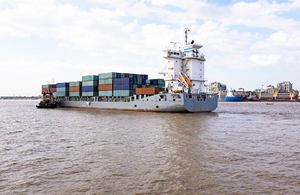TRA to defend UK against unfair international trade practices
The Trade Remedies Authority, a new independent body with powers to help defend UK economic interests from unfair international trading practices, has launched.

- The Trade Remedies Authority (TRA) has today (Tuesday 1 June) launched as an independent arms-length body.
- The authority will investigate complaints from UK businesses about injury caused by unfair import practices, such as dumping and subsidies.
- This work is already under way – until the Trade Act became law in April, the trade remedies function was incorporated in the Trade Remedies Investigations Directorate (TRID) of the Department for International Trade.
The Trade Remedies Authority, a new independent body with powers to help defend UK economic interests from unfair international trading practices, has launched today. The TRA will investigate complaints from UK industries about unfair trading practices and unforeseen surges in imports.
The TRA will operate as an arms-length body of the Department for International Trade to investigate possible cases of dumping and subsidised imports through robust and objective analysis of evidence. Where appropriate, it will recommend the imposition of new trade remedy measures, such as tariffs, to stop injury to UK producers harmed by the unfair trading practices.
The new body’s investigators will be reviewing 43 existing EU trade remedy measures relevant to UK industry which were transitioned when the UK left the EU Customs Union Eleven of these transition reviews are currently live, covering products from a range of sectors, including steel, fisheries and biodiesel.
Since 1 January this year, UK producers have also been able to apply for investigations into the need for new trade remedy measures. All applications can be made through the TRA’s online case management platform, the Trade Remedies Service. The TRA is the first organisation of its kind in the world to offer an end-to-end digital service for trade remedies cases.
Chief Executive of the Trade Remedies Authority Oliver Griffiths said:
The launch of the TRA today is an important moment for UK trade policy. The TRA will be dedicated to defending British economic interests against unfair international trade practices, providing independent, data-driven recommendations to the Government.
International Trade Minister, Ranil Jayawardena said:
Britain’s newly independent trade remedies system will help protect important British industries such as steel manufacturers and ceramics producers from harmful global trading practices.
The TRA will help create a level playing field for British businesses so they can compete with overseas producers, protecting them from unfair trading practices and unforeseen surges in imports.
The UK’s trade remedies system has been designed based on four principles: proportionality, transparency, impartiality and efficiency.
Oliver Griffiths joined TRID as Chief Executive Designate in January 2021. With the creation of the TRA, he joins the Chair, Simon Walker, three non-executive directors and two executive directors, to collectively form the TRA Board. The non-executive directors – Adam Marshall, John Hughes and Patricia Gallan – bring a wealth of experience across an array of fields and were appointed in accordance with the Governance Code on Public Appointments. The two executive directors on the Board are Clare Brodie and Steve O’Donoghue.
Notes to editors:
- The Trade Remedies Authority has been set up as a consequence of the UK leaving the EU. It provides an independent body which can investigate claims of unfair import practices impartially, as required by World Trade Organization rules. Previously, the UK was covered by the European Commission’s trade remedies investigation body, as an EU member state.
- You can find out about the TRA’s active investigations here and about the TRA’s case processes online here.
- Patricia Gallan QPM is a qualified barrister, detective and hostage negotiator. She retired as Assistant Commissioner Specialist Crime and Operations of the Metropolitan Police Service in 2018. Patricia is a Trustee of the Charity Red Thread & Chair of Governors at an East London Infant & Junior School. She is also a Non-Executive Director for Her Majesty’s Revenue and Customs.
- John Hughes is an expert in non-technical risk and external affairs; strategic problem-solving, the provision of independent advice to executives and the development of international teams. After a long career with BP, he is now a Non-Executive Director and specialist adviser to companies on non-technical risk mitigation and the management of strategy and governance internationally.
- Adam Marshall has served as Director General of the British Chambers of Commerce since March 2016. He was previously the organisation’s Executive Director of Policy and External Affairs (2009-2016). Prior to joining BCC, Adam helped to start up the Centre for Cities, built commercial links between universities and industry, and worked in local politics and the broadcast media. Adam ended his tenure as BCC Director General on 31st March 2021.
- Clare Brodie is a lawyer with over 20 years’ experience in regulatory and international law, having worked for US firm Cleary Gottlieb Steen and Hamilton in Brussels on anti-trust and EU law matters. She joined the Competition Commission in the UK and worked on merger and market investigations before moving into central government and working in a number of departments including the Cabinet Office and the (former) Department of Energy and Climate Change. Clare joined TRID as General Counsel in 2018.
- Steve O’Donoghue is Director of Corporate Services. He was previously Director of Finance & HR at the public spending watchdog Audit Wales, where he helped set up new governance arrangements under the Public Audit (Wales) Act 2013. Prior to that, Steve was Head of Resources at the Welsh Parliament Commission, where he led the finance, HR and governance teams, having previously spent 15 years in local government bodies in Wales.